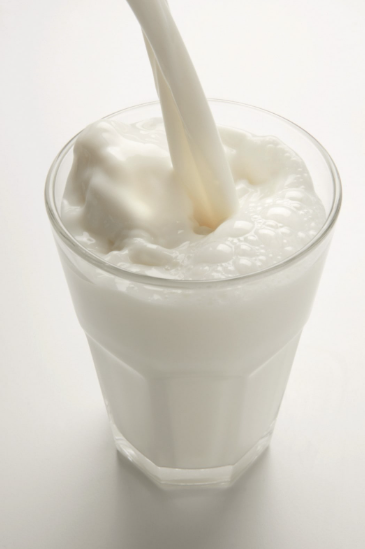
Is Milk Healthy? A Comprehensive Look at Its Benefits and Potential Risks
Milk has been a dietary staple for centuries, praised for its nutritional benefits, including calcium, protein, and essential vitamins. Historically, it’s been regarded as an essential part of a balanced diet, particularly for children. However, in recent years, milk’s health status has become a topic of debate. With the rise of plant-based diets, lactose intolerance concerns, and potential links between milk consumption and various health issues, the question remains: Is milk really healthy?
As we continue to learn more about how diet impacts health, milk’s role in promoting wellness is being questioned. For some, it’s an indispensable superfood for strong bones and muscle recovery, while others associate it with digestive issues, inflammation, and even concerns about heart health. So, let’s explore the truth about milk’s benefits and risks to help you make informed choices.
What’s Inside Milk? A Look at Its Nutritional Benefits
Milk is packed with essential nutrients that support various aspects of health. Here’s a breakdown of what makes milk such a popular choice for many people:
-
Protein: A cup of whole milk provides about 8 grams of high-quality protein, essential for muscle growth and repair. It’s a great option for those looking to fuel their bodies after exercise or to maintain healthy muscle mass.
-
Fat: Depending on the type, milk’s fat content varies. Whole milk has around 8 grams of fat per cup, while reduced-fat (2%) milk contains about 5 grams, and skim milk has virtually none. The fat found in milk is primarily saturated, which has raised concerns regarding heart health. However, recent studies suggest that its effect on heart disease might not be as harmful as once thought.
-
Carbohydrates: Milk contains lactose, a natural sugar that provides about 12 grams of carbohydrates per cup. For those with lactose intolerance, this can cause discomfort, but lactose-free options are available to address this concern.
Key Micronutrients:
-
Calcium: A cup of milk provides approximately 300 mg of calcium, around 30% of the daily recommended intake. Calcium is vital for maintaining strong bones and preventing osteoporosis.
-
Vitamin D: Many milk products are fortified with vitamin D, which helps the body absorb calcium more efficiently and also plays a role in immune function.
-
B Vitamins: Milk contains important B vitamins, such as B12 and riboflavin (B2), which support nerve function and energy production.
-
Potassium: With about 300 mg per cup, milk helps regulate blood pressure and contributes to muscle and nerve function.
Plant-Based Alternatives: How Do They Compare?
As plant-based diets gain popularity, alternatives to cow’s milk like almond, soy, oat, and coconut milk are becoming common. While these milk substitutes can mimic some of the nutritional benefits of dairy, there are differences to note:
-
Almond Milk: This option is low in calories and naturally lactose- and cholesterol-free but lacks protein compared to cow’s milk.
-
Soy Milk: Soy milk closely matches cow’s milk in protein content, making it a good option for those seeking a protein-rich alternative.
-
Oat Milk: Oat milk is known for its creamy texture and sweet flavor but is higher in carbohydrates and sugar than other plant-based options.
-
Coconut Milk: While coconut milk is rich and creamy, it is low in protein but contains healthy fats known as medium-chain triglycerides (MCTs).
While most plant-based milks are fortified with calcium and vitamin D to provide similar benefits to dairy, many of them lack the natural protein found in cow’s milk. If protein intake is important to you, soy milk may be a suitable alternative.
Health Benefits of Milk
Milk is packed with nutrients that contribute to various aspects of health. Here are some of its key benefits:
Bone Health: Calcium and Vitamin D
Milk is best known for its role in supporting bone health. It is one of the best sources of calcium, a vital mineral for bone formation and maintenance. One cup of milk provides about 30% of the daily recommended calcium intake, which can help prevent osteoporosis and other bone-related issues. Many milk products are also fortified with vitamin D, which aids in calcium absorption, further supporting bone health.
Muscle Growth and Recovery: Protein Power
Milk provides a complete source of protein, including both casein and whey proteins, which are essential for muscle repair and recovery. Whey protein is quickly digested, making it ideal for post-workout recovery, while casein digests slowly, providing a sustained release of amino acids. This makes milk an excellent recovery drink after exercise, particularly for athletes and those engaging in regular physical activity.
Weight Management: Helping You Feel Full
Milk can be helpful in weight management due to its ability to promote satiety. The combination of protein and fat in milk helps keep you feeling full for longer, which can reduce unnecessary snacking and aid in portion control. Additionally, some studies suggest that the calcium in milk can enhance fat breakdown and support metabolism, further aiding weight management.
Dental Health: Strengthening Teeth
Milk is beneficial for dental health as well. The calcium and phosphorus in milk strengthen tooth enamel and protect against decay. Milk has also been shown to neutralize acids in the mouth, helping to reduce the risk of cavities and tooth erosion. Furthermore, the lactoferrin in milk can prevent harmful bacteria from growing in the mouth, contributing to better oral hygiene.
Is Dairy Really Good for You?
While milk offers many health benefits, it’s not without its drawbacks. Some people experience negative health effects from milk, and there are growing concerns about its ethical and environmental impact. Let’s take a look at some of the potential risks:
Lactose Intolerance and Dairy Allergies
Lactose intolerance is a common condition where the body cannot properly digest lactose, the sugar in milk. Symptoms of lactose intolerance include bloating, gas, diarrhea, and stomach cramps. This condition affects a significant portion of the population, particularly those of East Asian, African, and Native American descent.
Dairy allergies are less common but can be more severe. These allergies occur when the immune system reacts to proteins like casein and whey, and they can cause symptoms ranging from mild rashes to severe reactions like anaphylaxis.
Heart Disease and Saturated Fat
One of the concerns regarding milk is its saturated fat content, especially in whole milk. High intake of saturated fats is linked to increased levels of LDL (bad) cholesterol, which can lead to plaque buildup in arteries and raise the risk of heart disease. However, recent research suggests that the link between dairy fat and heart disease may not be as strong as once thought. Some studies show that dairy fat may even have protective effects, particularly in fermented dairy products like yogurt.
Cancer Risks: Hormones in Milk
There are concerns about hormones in milk, particularly estrogen, which may influence the development of hormone-related cancers like breast and prostate cancer. Additionally, some dairy products are linked to increased levels of insulin-like growth factor (IGF-1), which is associated with higher risks of colorectal cancer. While more research is needed, some experts recommend moderating dairy consumption, particularly for individuals at higher risk for hormone-sensitive cancers.
Inflammation and Autoimmune Concerns
Some individuals report increased inflammation after consuming dairy, particularly those with autoimmune conditions. Certain proteins in milk, like casein, may trigger inflammatory responses in sensitive individuals. Although more research is needed, some people with autoimmune diseases find that eliminating dairy reduces symptoms like joint pain and swelling.
Ethical and Environmental Concerns
Ethical and environmental issues related to dairy farming are also significant considerations. The dairy industry has been criticized for its treatment of animals, including intensive confinement and the use of hormones and antibiotics. Additionally, dairy farming has a large carbon footprint due to high water usage and methane emissions, contributing to climate change. As awareness of these issues grows, more people are opting for plant-based milk alternatives.
Conclusion: Is Milk Healthy for You?
Milk offers a range of health benefits, including promoting bone health, supporting muscle recovery, and aiding in weight management. However, it’s not suitable for everyone. Those with lactose intolerance or dairy allergies should avoid it, and individuals concerned about saturated fat, cancer risks, or inflammation may want to consider reducing their dairy intake.
Ultimately, whether milk is healthy depends on your personal health needs and values. If you tolerate it well, milk can be a valuable addition to a balanced diet. If not, there are many plant-based alternatives that can provide similar nutritional benefits. The key is moderation and finding what works best for your body and lifestyle.




